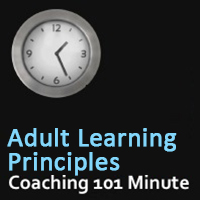 “How Do Adults Learn?”
“How Do Adults Learn?”
Some of the first known life coaching sessions were developed out of adult learning programs that were run in New York in the 1960s. These occurred in the middle of a very exciting period of study about the way adults learned. It seems strange now, but prior to the 1960s, the common held belief was that the bulk of learning occurred in childhood, with only a handful of people, such as academics, continuing to learn in a significant way in their adulthood. Little thought had been given to whether adult learning might be different in nature from childhood learning.
In our Coaching 101 classes this week we talked a lot about adult learning and we looked at research that was done back in the 1960s and 1970s, most notably by Malcolm Knowles, looking at how adults learn and different learning principles. For the purpose of our time together today for our Coaching 101 Minute, we’re going to do an overview of the 6 Principles of Adult Learning. These were initially designed to inform the way courses or classes for adults would be structured. They can be looked at from a coach approach as well.
6 Principles Of Adults Learning
1) Adults are autonomous and self-directed
They need to be free to direct themselves. Their teachers must actively involve adult principles in the learning process and serve as facilitators, guiding participants to their own knowledge, rather than simply providing them with facts. An old concept that I have always had in my mind was that facts tell and stories sell. So in looking at it from a learning concept, of course, we will learn more if we have a story attached to it and even more so if the story applies to us directly.
2) Adults have accumulated a foundation of life experiences and knowledge
This experience and knowledge including work experience, family responsibilities or previous education. They need to continue learning in this knowledge/experience base. To help them do so, teachers, facilitators, and coaches can draw out participants’ experiences and knowledge which is relevant to the topic. They must relate theories and concepts to the participants and recognize this value of experiencing the learning.
3) Adults are goal-oriented
Upon enrolling in a course, adults usually know what goals they want to obtain; therefore, they appreciate an education program that is organized and has clearly defined elements and structures that show participants how this class will help them to obtain their goal.
4) Adults are relevancy-oriented
They must see a reason for learning something. Learning has to be applicable to their work or other responsibilities to be of value to them.
5) Adults are practical
Adults focus on the aspects of learning that are most useful to them in their work/life. They must be interested in the knowledge itself, not just the knowing of knowledge.
6) Adults need to be shown respect and structures
As with all learning, adults educators must acknowledge the wealth of experience adult participants bring to the classroom. Adults should be treated as equals in the experience and allowed to voice their own opinions freely.
These learning principles are all present in coaching. It is no wonder than that coaching is used extensively in workplace learning programs throughout the world, either on its own or following other training to ensure that a suitable change can occur.
Training FAQ
Other questions that were asked in our Coaching 101 classes this week:
- How do I know if a client is satisfied with the coach that they’re receiving?
- What is the origin of the coaching profession?
- How does mentor coaching work in the profession of coaching?
If you want to experience the principles of adult learning for yourself, I really encourage you to come to an upcoming Coaching 101 class next week as it provides you a full experience of how you can be an active participant in the learning process here at International Coach Academy. There are many different time options, so go and find a time option that works best for you. We will save a seat for you.